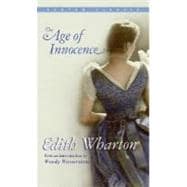
Note: Supplemental materials are not guaranteed with Rental or Used book purchases.
Purchase Benefits
Looking to rent a book? Rent The Age of Innocence [ISBN: 9780553214505] for the semester, quarter, and short term or search our site for other textbooks by WHARTON, EDITH. Renting a textbook can save you up to 90% from the cost of buying.
| About This Series | p. ix |
| Introduction | p. 1 |
| A Note on the Text | p. 10 |
| The Age of Innocence | p. 11 |
| Background Readings | p. 287 |
| Questions of Culture | p. 289 |
| From "The Metropolitan Gentry: Culture against Politics" | p. 289 |
| From "The Genteel Tradition in American Philosophy" | p. 294 |
| From "Democratic Vistas" | p. 300 |
| From "Merchants and Masterpieces: The Story of the Metropolitan Museum of Art" | p. 303 |
| "The Location and Decoration of Houses in The Age of Innocence" | p. 318 |
| From How the Other Half Lives | p. 332 |
| Marriage and Divorce | p. 338 |
| From Domestic Revolutions | p. 338 |
| From "For the Wedding Night" | p. 345 |
| Travel and Sport | p. 348 |
| From the Introduction to American Travel Writers, 1850-1915 | p. 349 |
| From "Americans Abroad" | p. 355 |
| From "Newport" | p. 357 |
| From "The Lawn Set" | p. 359 |
| Anthropology | p. 364 |
| From Violence and the Sacred | p. 364 |
| From Primitive Culture | p. 366 |
| Other Writings | p. 369 |
| Writing The Age of Innocence | p. 371 |
| The Ways of Old New York | p. 372 |
| The Childishness of American Women | p. 378 |
| "The Valley of Childish Things" | p. 380 |
| Winning the Pulitizer Prize | p. 381 |
| Critical Readings | p. 385 |
| From "The Composition of Edith Wharton's The Age of Innocence" | p. 387 |
| From "Cool Diana and the Blood-Red Muse: Edith Wharton on Innocence and Art" | p. 393 |
| From "Becoming the Mask: Edith Wharton's Ingenues" | p. 404 |
| From "Angel of Devastation: Edith Wharton on the Arts of the Enslaved" | p. 408 |
| From "The Age of Innocence and the Bohemian Peril" | p. 411 |
| From "Edith Wharton: The Archeological Motive" | p. 414 |
| From "'Hunting for the Real': Wharton and the Science of Manners" | p. 418 |
| From "A Note on Wharton's Use of Faust" | p. 430 |
| From "The Mind in Chains: Public Plots and Personal Fables" | p. 432 |
| From "American Naturalism in Its 'Perfected' State: The Age of Innocence and An American Tragedy" | p. 434 |
| From "The Scorses Interview: On Filming The Age of Innocence" | p. 441 |
| "Of Writers and Class: In Praise of Edith Wharton" | p. 448 |
| Works Cited | p. 454 |
| For Further Reading | p. 455 |
| Table of Contents provided by Syndetics. All Rights Reserved. |
The New copy of this book will include any supplemental materials advertised. Please check the title of the book to determine if it should include any access cards, study guides, lab manuals, CDs, etc.
The Used, Rental and eBook copies of this book are not guaranteed to include any supplemental materials. Typically, only the book itself is included. This is true even if the title states it includes any access cards, study guides, lab manuals, CDs, etc.
Excerpted from The Age of Innocence by Edith Wharton
All rights reserved by the original copyright owners. Excerpts are provided for display purposes only and may not be reproduced, reprinted or distributed without the written permission of the publisher.